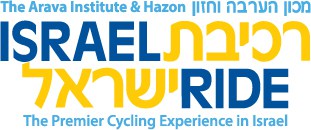Shabbat on the Israel Ride is always something special. After three days of riding, all riders welcome a day of rest, regatrdless of their usual practice at home in observing Shabbat. On Friday night, the community came together after two days of riding in mostly separated groups, and welcomed various guests of riders to the hotel in Mitzpe Ramon. Friday services were led by a Rabbi and a rabbinical student, both from Colorado.
Saturday morning is truely a day of rest. Riders chose among a gental walk to the Makhtesh, yoga, or casual morning services, where everyone was able to reflect on how riding through the desert changes your understanding of the biblical stories of Isaac. A panel from Hazon explained the breadth of their work across America, focusing on how creating new gateways is necessary to the strengthening the continuity of Jewish life. After lunch, alumni from the Arava Institute (Jewish/Palestinian/Muslim/Israeli/Christian/Jordanian) shared their personal journeies, allowing riders to ask some of the tough questions that until now have not been openly discussed on the ride. The day of rest closed with Havdalah, as the riders transitioned back into thinking about the next day’s ride.
The following reflections are by Lloyd and Susan Lense, from East Setauket, NY
We had a stimulating day. After a late breakfast, we walked to the makhtesh. This unique geological formation was created by water removing sand from under the limestone shell of the earth, causing the mountain to sink. We looked forward to seeing it at dusk lit up by the sun but, it rained! This is the beginning of the rainy seasons the desert and the community needs the 1/4 inch of rain that it gets each year. Tomorrow we will head off for super arid desert, which gets even less.
During the afternoon we listened to a discussion about the bedouins of modern day Israel. This is a very complicated problem with pressure from outside political forces pushing them involved parties not to compromise. In the meantime, thousands off people suffer. The we broke up into small groups to talk with Arava Institute alumni about their experiences. Bike Israel provides the major financial support for this program. Each class consists of 1/3 Israeli Jews, 1/3 Palestinians, and 1/3 other foreigners. They come together to study environmental issues–legal issues, educational issues, hydrology, solar energy, political, cross nation resource sharing. The aim is to produce young people who can help states to cooperate, to address shared critical problems, such as the lack of sufficient drinking water and the degradation of the aquifers. The motto of the Arava Institute is “Mother Nature knows no boundaries”. I heard from a Palestinian from Jordan who now is a post doc at Hebrew University. Though he had already completed college before he thought to apply, he had to overcome his parents’ objections before coming to Arava, and he lost most of his friends because he came to Israel. He continues to face discrimination when he returns to Jordan because of his having Jewish friends and studying in Israel.





Comments are closed.